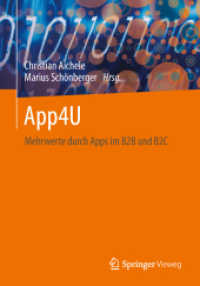- ホーム
- > 洋書
- > 英文書
- > Business / Economics
基本説明
邦訳:2011年8月・東洋経済新報社
New in paperback. Hardcover was published in 2010. In 1995, economist Rachel Kranton wrote future Nobel Prize-winner George Akerlof a letter insisting that his most recent paper was wrong. Identity, she argued, was the missing element that would help to explain why people--facing the same economic circumstances--would make different choices. This was the beginning of a fourteen-year collaboration--and of Identity Economics.
Full Description
Identity Economics provides an important and compelling new way to understand human behavior, revealing how our identities--and not just economic incentives--influence our decisions. In 1995, economist Rachel Kranton wrote future Nobel Prize-winner George Akerlof a letter insisting that his most recent paper was wrong. Identity, she argued, was the missing element that would help to explain why people--facing the same economic circumstances--would make different choices. This was the beginning of a fourteen-year collaboration--and of Identity Economics. The authors explain how our conception of who we are and who we want to be may shape our economic lives more than any other factor, affecting how hard we work, and how we learn, spend, and save. Identity economics is a new way to understand people's decisions--at work, at school, and at home. With it, we can better appreciate why incentives like stock options work or don't; why some schools succeed and others don't; why some cities and towns don't invest in their futures--and much, much more. Identity Economics bridges a critical gap in the social sciences. It brings identity and norms to economics.
People's notions of what is proper, and what is forbidden, and for whom, are fundamental to how hard they work, and how they learn, spend, and save. Thus people's identity--their conception of who they are, and of who they choose to be--may be the most important factor affecting their economic lives. And the limits placed by society on people's identity can also be crucial determinants of their economic well-being.
Contents
PART ONE: Economics and Identity ONE: Introduction 3 CHAPTER TWO: Identity Economics 9 CHAPTER THREE: Identity and Norms in Utility 17 POSTSCRIPT TO CHAPTER THREE A Rosetta Stone 21 CHAPTER FOUR: Where We Fit into Today's Economics 27 PART TWO: Work and School CHAPTER FIVE: Identity and the Economics of Organizations 39 CHAPTER SIX: Identity and the Economics of Education 61 PART THREE: Gender and Race CHAPTER SEVEN: Gender and Work 83 CHAPTER EIGHT: Race and Minority Poverty 97 PART FOUR: Looking Ahead CHAPTER NINE: Identity Economics and Economic Methodology 113 CHAPTER TEN: Conclusion, and Five Ways Identity Changes Economics 121 Acknowledgments 131 Notes 135 References 153 Index 173








